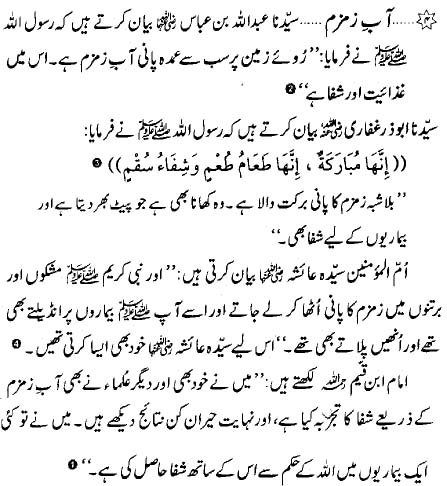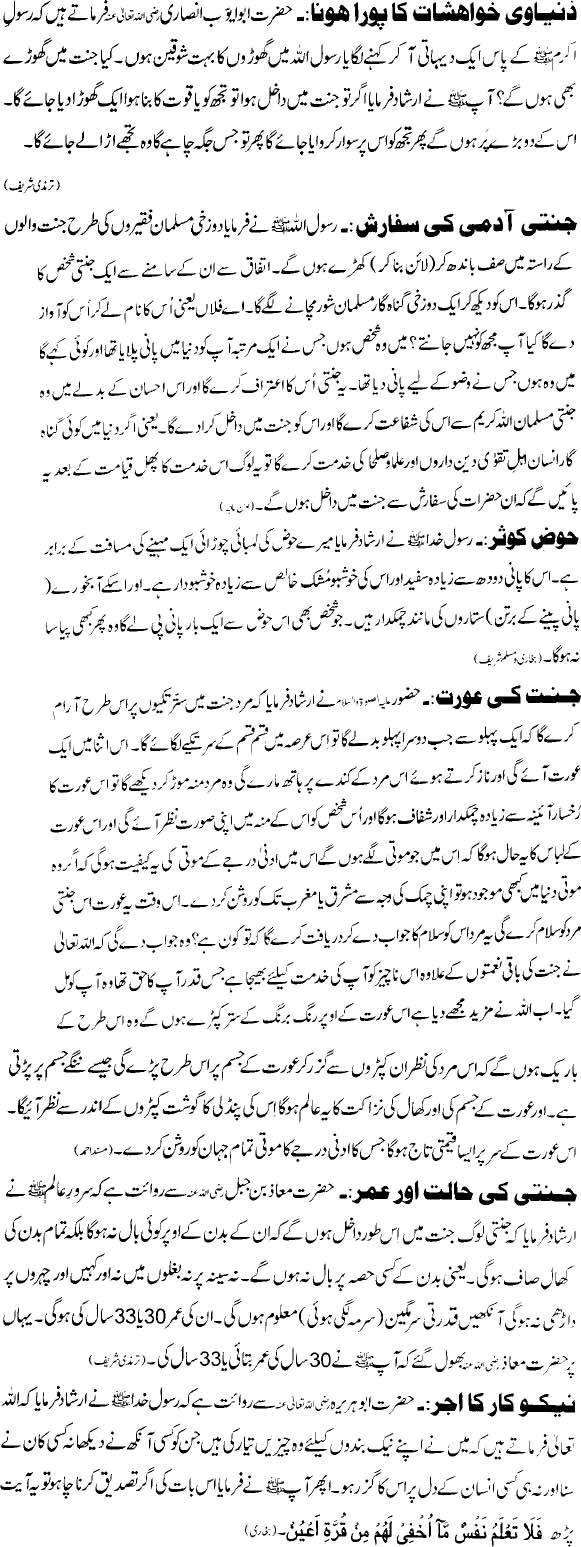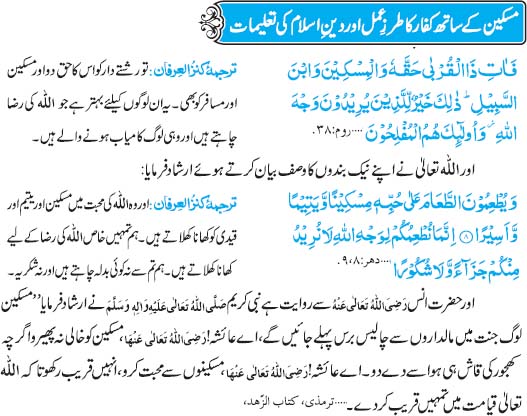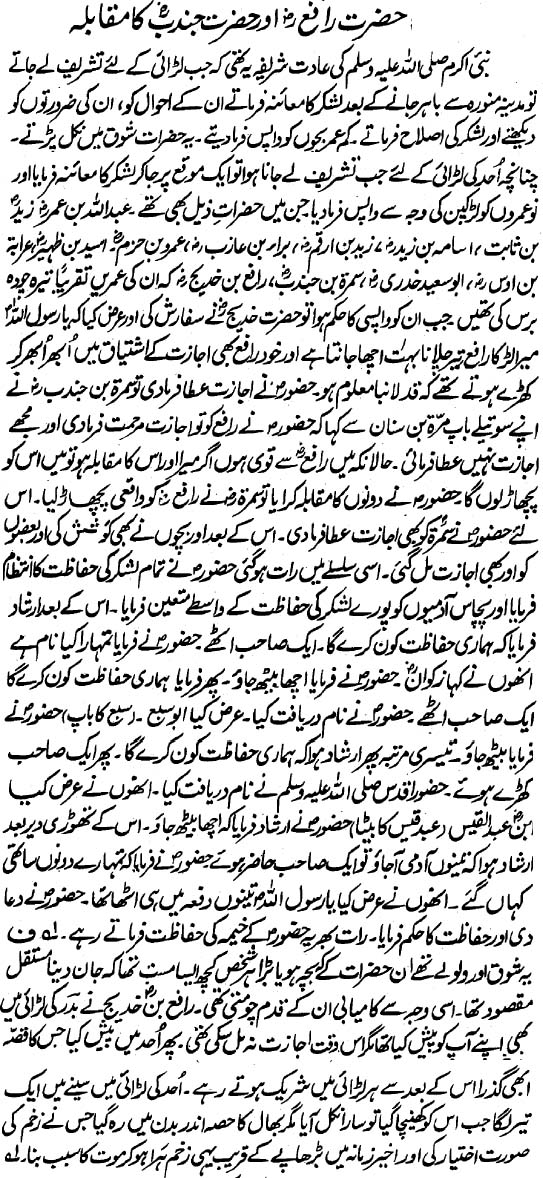
Aab-e-Zamzam
In The Belly Of The Whale
Have you ever felt as though things are just too much for you, that you are in a situation you see no way of getting out of? Do you look at problems in our world today and wonder how they can ever be solved? All this, and more, is the story of Prophet Yunus (peace be upon him). The mission of Prophet Yunus (peace be upon him) is a timeless story that tells us there is a way out, if only we have faith.
Almighty Allah called Yunus (peace be upon him) to preach to the people of Nineveh. Nineveh was a great city, the capital of Assyria, and it had become an evil place. Yunus (peace be upon him) went to the people there and told them to give up their bad ways and to turn, instead, to Allah. But they wouldn’t listen to him, and so Yunus (peace be upon him) left them, calling down Allah’s wrath on them. His preaching failed, so he stormed off. This is the first very human touch in the story of Yunus (peace be upon him). Even though he was a prophet, Yunus (peace be upon him) was still a man, and he stormed out of the city when he didn’t get what he wanted. He even felt that he knew what Allah should do to these people, calling on Allah to punish them. We can identify with Yunus (peace be upon him) here, can’t we? On a human level, we often give up too soon, and we usually march off when we don’t get what we want. On a spiritual level, we see lots of wickedness in the world and think we know how the evildoers should be treated. Some people even take it upon themselves to punish them.
Jannat Ki Naimatien Bazuban Rasool e Akram (Sallallahu alaihi wasallam)


Ahdith: Jannat Ki Naimatien Bazuban Rasool e Akram (Sallallahu alaihi wasallam)
(Friday) The Celebration
Friday Prayer Bukhari: Book 2: Volume 13: Hadith 1 Narrated Abu Huraira:
I heard Allah’s Apostle (Sallallahu alaihi wasallam) saying, “We (Muslims) are the last (to come) but (will be) the foremost on the Day of Resurrection, though the former nations were given the Holy Scriptures before us. And this was their day (Friday), the celebration of which was made compulsory for them, but they differed about it. So Allah gave us the guidance for it (Friday) and all the other people are behind us in this respect: the Jews’ (holy day is) tomorrow (i.e. Saturday) and the Christians’ (is) the day after tomorrow (i.e. Sunday).”
Adam alai salaam Was Created On Friday
The Book Giving Description of the Day of Judgement, Paradise and Hell (Kitab Sifat Al-Qiyamah wa’l Janna wa’n-Nar)
Muslim: Book 39: Hadith 6707
Abu Haraira reported that Allah’s Messenger (may peace be upon him) took hold of my hands and said: Allah, the Exalted and Glorious, created the clay on Saturday and He created the mountains on Sunday and He created the trees on Monday and He created the things entailing labour on Tuesday and created light on Wednesday and lie caused the animals to spread on Thursday and created Adam (peace be upon him) after ‘Asr on Friday; the last creation at the last hour of the hours of Friday, i. e. between afternoon and night.
Maskeen Kay Sath Kufaar Ka Tarz e Amal Aur Deen-e-Islam Ki Taleemat

Maskeen Kay Sath Kufaar Ka Tarz e Amal Aur Deen-e-Islam Ki Taleemat
Superiority Of Sayyiduna Abu Bakr as-Siddiq Radi Allahu Ta’ala Anhu
The Ahl-e-Sunnat wa Jama’at has reached the consensus (Ijma’) that after the Prophets (Alaihim as-Salam), the best of creation are the four rightly guided Khalifas (Khulafa-e-Arba’a i.e., Hadrat Abu Bakr, Hadrat Umar, Hadrat Uthman, and Hadrat Ali Radi Allahu Ta’ala Anhum Ajma’een).
Their sequence of excellence is that Sayyiduna Abu Bakr as-Siddique is the most excellent, then Sayyiduna Umar, thereafter followed by the excellence of Sayyiduna Uthman and Sayyiduna Ali (Ridwanullahi Ta’ala Alaihim Ajma’een). Here, I present a few proclamations of the Classical Scholars and Jurists in this regard.
Proclamations of the Classical Scholars and Jurists
1. Imam al-Aazam Abu Hanifa gave one of the pithiest definitions of Sunnism in Islam:
“The doctrine of Ahl al-Sunna wal-Jama’a consists in preferring the Two Shaykhs (tafdil al-shaykhayn) [i.e., Abu Bakr and ‘Umar over the rest], loving the Two Sons-in-law (hubb al-khatanayn) [i.e., ‘Ali and ‘Uthman], and wiping on leather socks (al-mas-h ‘alal-khuffayn) [i.e., all three contrary to Shi’is].” [Khulasat al-Fatawa, Vol. 2, Page 381]
Narrated by Ibn ‘Abd al-Barr in al-Intiqa’ bi-Manaqib al-A’immat al-Thalathati al-Fuqaha’ through several different chains. The same is also related by Sufyan al-Thawri by al-La’laka’i in his I’tiqad Ahl al-Sunna, Vol. 1, Page
152.
2. Imam al-Aazam Abu Hanifah in Fiqh Al-Akbar:
“The most superior and the best of all men after prophets – blessings and peace upon them – is Abu Bakr as-Siddiq. And then, Umar ibn al-Khattab al-Faruq. And then Uthman ibn Affan Dhu’n Nurayn. And then Ali ibn Abu Talib al-Murtada. May Allah be well pleased with them all; they were worshippers and steadfast on Truth and sided with Truth. We love all of them.” [Fiqh Al-Akbar]
3. Imam al-Nawawi said in his Fatawa:
“Know that each of Abu Bakr and ‘Umar is better than ‘Ali according to the Consensus (ijma’) of Ahl al-Sunna. The proofs for this in well-known sound hadiths are too famous and countless to be listed.” [Fatawa Imam Nawawi, Page 264]
Sonay Say Pehle Ki Sunnatien


Sonay Say Pehle Ki Sunnatien
Shan e Umar (Razi ALLAH ANHO)
He has been awarded with a lot of praise by Our Beloved Prophet Hazrat MUHAMMAD Sallalaho alaih wassalm and said that If there had been any messenger after me, it would have been UMER (radi Allahu anhu).
There are many hadith that mention the Good qualities and special position of Umar bin Khattab (radi Allahu anhu).
Abu Saeed al Khudri reported that Muhammad said: “Every prophet has two wazeer (ministers) from the dwellers of the heaven (angels) and two wazeer from the inhabitants of the earth. So, my wazeer from the dwellers of heaven are Jibrael and Mikael, and my wazeer from the earthlings are Abu Bakr (radi Allahu anhu) and Umar (radi Allahu anhu).” from Jami Tirmidhi
Ibn Umar (radi Allahu anhu) said that one day, Muhammad (radi Allahu anhu) came out and entered the masjid, Abu Bakr (radi Allahu anhu) and Umar (radi Allahu anhu) with him, to his right and left. Muhammad (Sallallahu alaihi wasallam) had held their hands, and he said, “The three of us will be raised on the Day of Resurrection in this way.” from Jami Tirmidhi
Abu Saeed al Khudri (radi Allahu anhu) reported that he heard Prophet Muhammad (Sallallahu alaihi wasallam) say, “While I was asleep, I dreamt that people were brought to me, all of them wearing shirts. Some of the shirts reached only up to the chest, and some a little below the chest. Umar ibn al-Khattab (radi Allahu anhu) was also brought to me. His shirt was so long that it trailed on the ground, and he dragged it along as he walked.” Some of the Sahaba asked him its interpretation, and he (Sallallahu alaihi wasallam) said, “Religion.” from Sahih Bukhari and Muslim
Abu Hurairah (radi Allahu anhu) reported that Muhammad (Sallallahu alaihi wasallam) said, “Among the earlier ummah there have been muhaddath (who are blessed by Allah with inspiration). So if there is one in my ummah (who is blessed) then he is Umar (radi Allahu anhu).” from Sahih Bukhari and Sahih Muslim
Abu Zarr (radi Allahu anhu) reported that he heard Muhammad (Sallallahu alaihi wasallam) say, “Allah has placed Truth on Umar’s tongue, and he speaks only the truth.” From Abu Dawood
Ibn Umar (radi Allahu anhu) reported that Umar (radi Allahu anhu) said, “My thinking abided with my Lord on three matters (on which His Command was about to be revealed): the station of Ibrahim, the hijab, and the captives of the battle of Badr.” From Sahih Bukhari and Sahih Muslim.
Hazrat Rafay (radi Allahu anhu)Aur Hazrat Jundab (radi Allahu anhu) Ka Muqabla

Hazrat Rafay (radi Allahu anhu)Aur Hazrat Jundab (radi Allahu anhu) Ka Muqabla
The Straight Path
Aishah (May Allah be pleased with her) reported: Messenger of Allah (Sallallahu alaihi wasallam) never hit anything with his hand, neither a servant nor a woman, but of course, he did fight in the Cause of Allah. He never took revenge upon anyone for the wrong done to him, but of course, he exacted retribution for the sake of Allah in case the Injunctions of Allah about unlawful acts were violated.[Muslim]. 75/644 – Riyad Us-Saliheen (Gardens of the Righteous)
The Straight Path
Allah does not impose the belief in Him upon the heart of mankind. It is the individual’s heart that is either open to guidance or not. God’s prophets and messengers showed mankind the straight path. It is up to individuals to choose to follow the path or not. However, true guidance is not from the prophets, but from Allah alone.
How could this be?
Can someone who did not hear the message of any prophet, but is a good person, not be guided?
Of course not! Mankind is unable to discern ALL that is right and wrong with his own intellect, as hard as he may try.
God’s Guidance
The mission of the prophets was to convey the true message from their Lord and not their own minds or intellect. Among those who receive their message, some are guided, and some are not. This is when we delve into the core of the matter: it is the individual’s heart that is either open to guidance or not. Allah does not impose the belief in Him upon the heart of mankind, although the knowledge of His Oneness is imprinted in the heart of ALL mankind, but Satan, and his host, would do their best to stray mankind from the right path and thus forget the Creator and His message.
Thus, one who follows his desires and turns away from the true guidance, slowly marks his heart with stains of disbelief, which over time covers his entire heart and turns him against Allah – even though he may have fully heard the message of the messengers and the call to believe in the one God.

